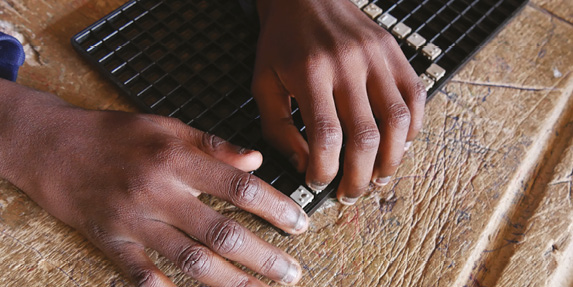Gift Mubambiki plays a keyboard in the middle of the chaotic traffic of Johannesburg, South Africa’s largest city, and has an alms cup at his feet. Every morning for the last ten years, he has walked two kilometers from his home to this corner in the city center. He is a blind beggar. He emigrated from Zimbabwe, the country just north of South Africa, for economic reasons. “I was finishing school but at a certain point I could no longer pay the tuition, so I left because many other blind people had already done this. They said life was easier here, and that maybe I would find the money to finish school.” There are an estimated 600 blind beggars in the city, all from Zimbabwe. Gift lives in a dilapidated building with others in his situation. Begging in Africa is different than in Europe: it’s more comprehensible, and beggars aren’t disparaged, but the fact that Gift is an undocumented migrant complicates his life.

He has no right to any kind of assistance for his home, healthcare, or work, and the xenophobic feelings of South Africans against Zimbabweans periodically become violent. Despite it all, he stays, even if what he earns isn’t enough to finish school, because it’s enough to live in a large country where the economy is growing and people have coins to give him. Gift’s story is similar to that of many others, whose stories are sometimes even more complex because blind migrants come with their families, with minors who have no right to go to school and are excluded from South African society. In addition to begging, other resources for survival come from foreign NGOs and especially from these people themselves, who come from the same region, create a group, organize to look for a house to share, and help each other. “The Blind Beggar” is one of London’s most famous pubs, and on European streets it’s hard to encounter blind beggars (relegated to 19th-century novels by Dickens). But they still exist in Johannesburg, and for many this is their salvation. So, for ten years, Gift Mubambiki walks his two kilometers and goes to an intersection in the city, starts playing his keyboard, and waits for his cup to fill up with coins.
Take a close look at Africa
The situation for blind people on the African continent
If it is hard for a blind person in Europe to have a job, a family, to socialize, things are much more complicated for a blind person in Africa. There are 5.9 million blind people in Africa (15.3% of the world’s population), and another 20.4 million are visually impaired. The causes of their blindness or impairment are different from those in Europe: infantile blindness due to malnutrition (lack of vitamin A), trachoma caused by bacterial infection, onchocerciasis caused by infection with a parasitic worm, simple cataract. These are only the main causes, and all of them can be cured if treated in time. But even if many African countries have a middle class almost comparable to ours, their poor populations are very large and are excluded from prevention and healthcare programs.




.png)